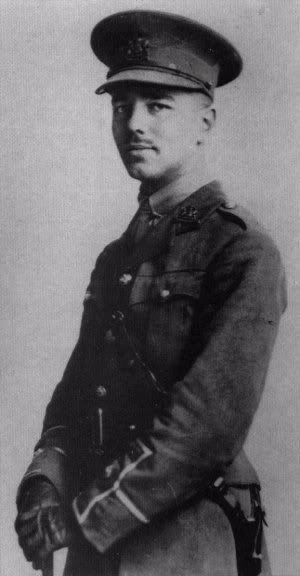
Dulce Et Decorum Est
by Wilfred Owen
Bent double, like old beggars under sacks,
Knock-kneed, coughing like hags, we cursed through sludge,
Till on the haunting flares we turned our backs
And towards our distant rest began to trudge.
Men marched asleep. Many had lost their boots
But limped on, blood-shod. All went lame; all blind;
Drunk with fatigue; deaf even to the hoots
Of disappointed shells that dropped behind.
GAS! Gas! Quick, boys!-- An ecstasy of fumbling,
Fitting the clumsy helmets just in time;
But someone still was yelling out and stumbling
And floundering like a man in fire or lime.--
Dim, through the misty panes and thick green light
As under a green sea, I saw him drowning.
In all my dreams, before my helpless sight,
He plunges at me, guttering, choking, drowning.
If in some smothering dreams you too could pace
Behind the wagon that we flung him in,
And watch the white eyes writhing in his face,
His hanging face, like a devil's sick of sin;
If you could hear, at every jolt, the blood
Come gargling from the froth-corrupted lungs,
Obscene as cancer, bitter as the cud
Of vile, incurable sores on innocent tongues,--
My friend, you would not tell with such high zest
To children ardent for some desperate glory,
The old Lie: Dulce et decorum est
Pro patria mori.
Wilfred Owen is my favorite war poet. Those of you who know me well, know that I'm fascinated with the Great War and the deplorable conditions the soldiers of that war were forced to endure. Wilfred Owen was born in Oswestry in 1893 to a middle class British family. He enlisted in the Artist's Rifles in October of 1915. In May 1917 he was diagnosed with shell-shock and sent to Craiglockhart Hospital for treatment. It was there that he met the well-known poet, Siegfried Sassoon and soon after published his first poems in the hospital journal, The Hydra. Owen was killed on 4 November, just days before the Armistice was signed and the war ended. This poem gives me chillls every time I read it. The last two lines are Latin for, "It is sweet and fitting to die for one's country."


what a fascinating poem! no wonder so many of our soldiers are traumatized and suffered from PTSD. they called it "shell shock"then! As I read thru your blog, you remind me so much of my oldest daughter! I want to read your book!
ReplyDeleteThanks, Rhonda!
ReplyDeleteI do love this poem. When I was about nine or ten, my best friend's father was a vet of the Great War. I've never forgotten him and I guess it gave me a lifelong interest in that war and the plight of the soldiers in the trenches.
That line, "To children ardent for some desperate glory" always gives me the chills.
So your daughter must like history and reading? :)
Hey, great blog and I'm really loving your header! Thanks for the follow. I'm following you too!
ReplyDeleteWe wrote an essay for English class on this poem! I absolutely loved this poem, and it remains to be one of my favourite poems of all times!
ReplyDeleteLoving your BLog. Am a new follower!
Do drop by http://books-eatmeup.blogspot.sg/, if you can!